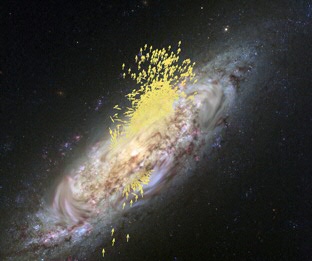Dr. Helmer Koppelman receives MERAC prize for Best Early Career Researcher
Dr. Helmer Koppelman has received the MERAC prize for Best Early Career Researcher for his PhD thesis at the Kapteyn Astronomical Institute Groningen. He receives this prize in the theoretical astrophysics category, for his multi-faceted and superb approach to the field of galactic archaeology. After completing his bachelor's, master's and PhD at the University of Groningen and a postdoc trajectory at Princeton in the United States, Koppelman is currently working as a data scientist at a company in the Netherlands.

Helmer Koppelman's approach to theoretical astrophysics, consisting of a combination of theoretical models and simulations with the newest observational data sets, has transformed the understanding of the history and dynamics of the Milky Way.
MERAC prices
The MERAC Awards are presented annually by the European Astronomical Society to recognize and support young European astronomers. In addition to the theoretical astrophysics category, there is the observational astrophysics category and the new techniques category. The awards come with a cash prize of EUR 25,000.
| Last modified: | 11 March 2022 1.11 p.m. |
More news
-
13 May 2024
‘The colourful cells of petals never get boring!’
Most people will enjoy colours in nature. However, the interest of evolutionary biologist Casper van der Kooi goes much further: he studies how flowers, birds, butterflies, and beetles get their colours. He also studies how these colours are used...
-
13 May 2024
Trapping molecules
In his laboratory, physicist Steven Hoekstra is building an experimental set-up made of two parts: one that produces barium fluoride molecules, and a second part that traps the molecules and brings them to an almost complete standstill so they can...
-
07 May 2024
Lecture with soon to be Honorary Doctor Gerrit Hiemstra on May 24
In celebration of his honorary doctorate, FSE has invited Hiemstra to give a lecture entitled ‘Science, let's talk about it’ on the morning of 24 May
